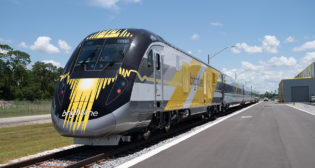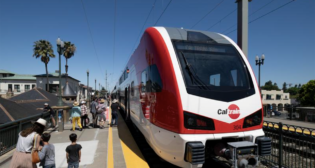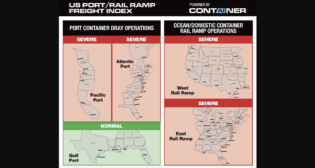
AAR’s
Written by William C. Vantuono, Editor-in-ChiefThe Association of American Railroads says it is suing the federal government for giving Amtrak the “authority to promulgate binding rules governing the conduct of its contractual partners, the freight railroads.”
Such authority, bestowed to Amtrak by Congress, gives the national railroad passenger carrier an unfair political hammer, hampering host freight railroads due to its “historically poor record of on-time performance and (a) chronic inability to generate revenue sufficient to cover its operating costs,” AAR says.
 AAR is challenging the constitutionality of the Passenger Rail Investment and Improvement Act of 2008 (PRIIA), which gives Amtrak and the Federal Railroad Administration the power to “jointly … develop new or improve existing metrics and minimum standards for measuring the performance and service quality of intercity passenger train operations.”
AAR is challenging the constitutionality of the Passenger Rail Investment and Improvement Act of 2008 (PRIIA), which gives Amtrak and the Federal Railroad Administration the power to “jointly … develop new or improve existing metrics and minimum standards for measuring the performance and service quality of intercity passenger train operations.”
Pro-Amtrak advocates note PRIAA, signed into law by President George W. Bush, intended to address Amtrak’s on-time performance issues which (the advocates charge) were exacerbated by freight railroad hosts giving Amtrak short shrift as a tenant and failing to comply with the spirit—and sometimes the letter—of earlier law.
AAR says the metrics and standards section of PRIAA establishes performance standards for Amtrak, but relies heavily on “Conductor Delay Reports” as evidence for determining whether the railroads are at fault for Amtrak’s missing its marks. If an Amtrak train falls below 80 percent of the on-time standard for two consecutive calendar quarters, the Surface Transportation Board can investigate Amtrak or the host freight railroad. The Board may order the host rail carrier to pay damages to Amtrak.
Amtrak owns most of the Northeast Corridor, as well as NEC offshoots such as the Keystone Corridor in Pennsylvania and its New Haven-to-Springfield route in Connecticut and Massachusetts, along with other short stretches of right-of-way in New York State and in Michigan. But the vast majority of its route structure operates over freight railroad rights-of-way, with Class I railroads hosting most of the network.

AAR, representing the freight roads, say PRIIA is “unconstitutional because it improperly delegates lawmaking and rulemaking authority to a private company.”
AAR’s suit names the Department of Transportation, Transportation Secretary Ray LaHood, the Federal Railroad Administration, and Federal Railroad Administrator Joseph Szabo. AAR is represented by Thomas Dupree Jr. with Gibson Dunn & Crutcher and by its house counsel Louis Warchot. Amtrak, an AAR member itself, appears not to have been named as a defendant.



